Unit 1 Can you play the guitar?SectionA(GrammarFocus-3c)教学课件 (共28张PPT)
文档属性
| 名称 | Unit 1 Can you play the guitar?SectionA(GrammarFocus-3c)教学课件 (共28张PPT) | 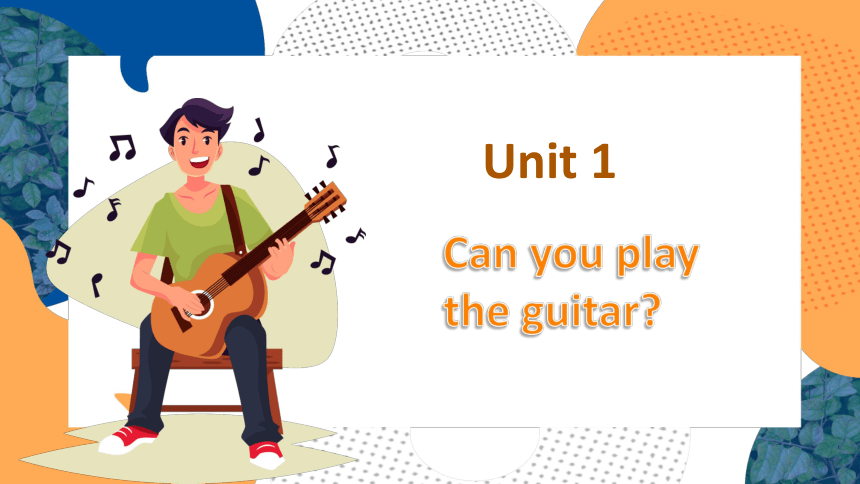 | |
| 格式 | zip | ||
| 文件大小 | 6.1MB | ||
| 资源类型 | 教案 | ||
| 版本资源 | 人教新目标(Go for it)版 | ||
| 科目 | 英语 | ||
| 更新时间 | 2022-03-01 13:29:42 | ||
图片预览

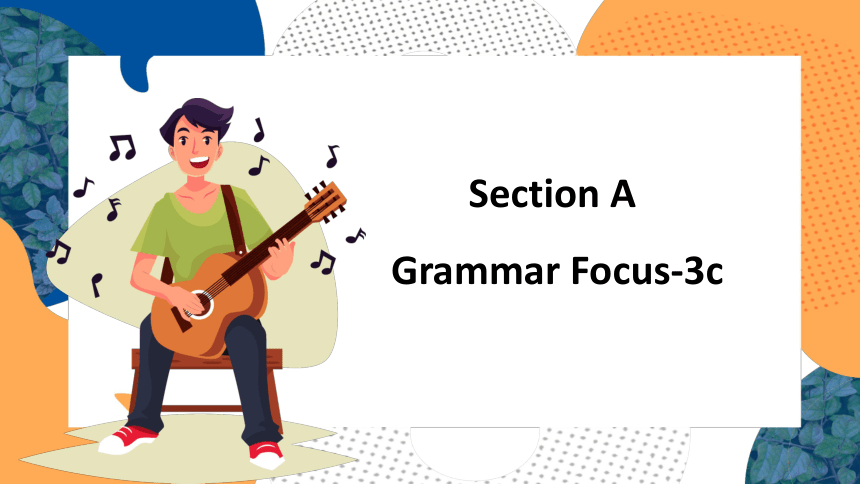
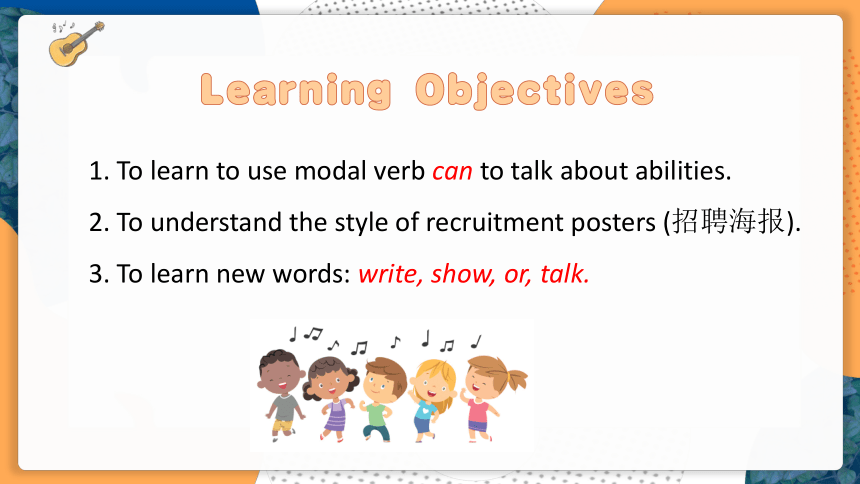
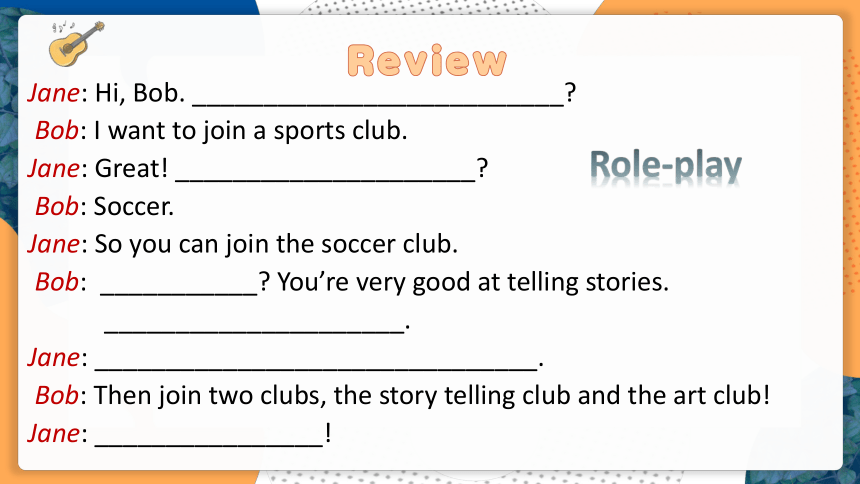
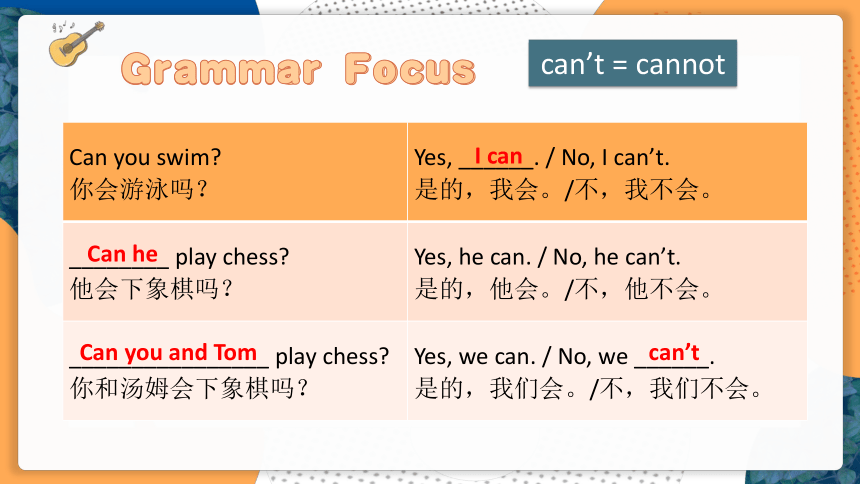
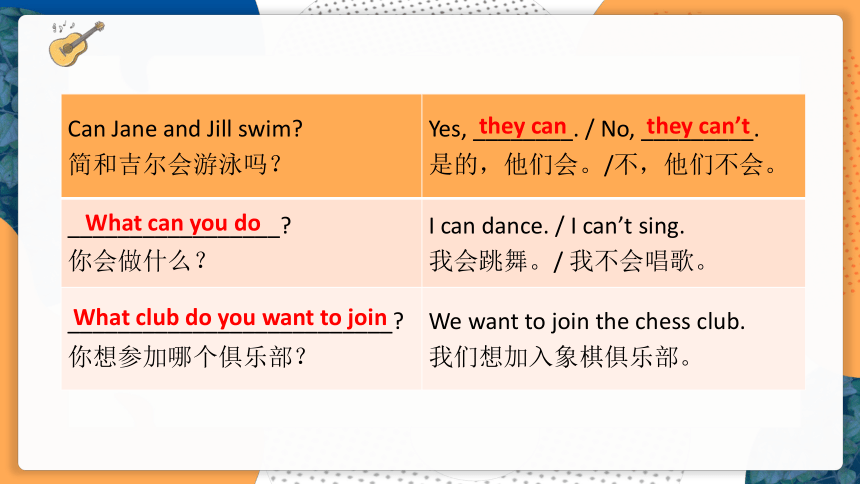
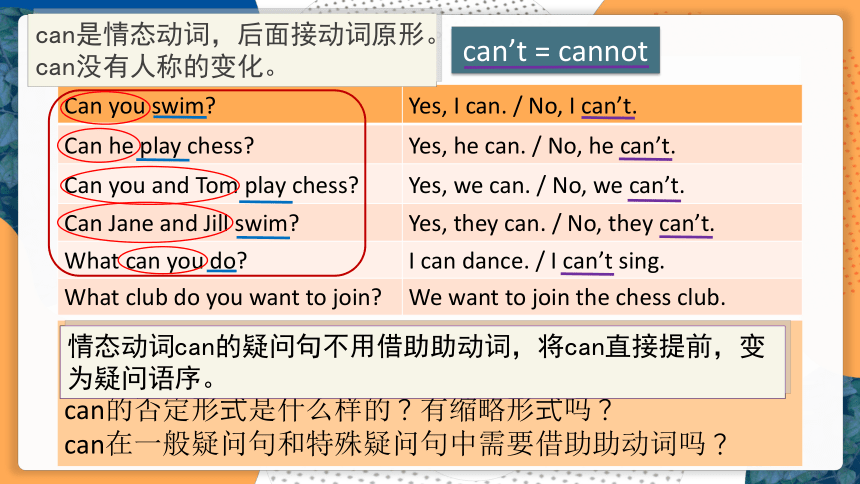
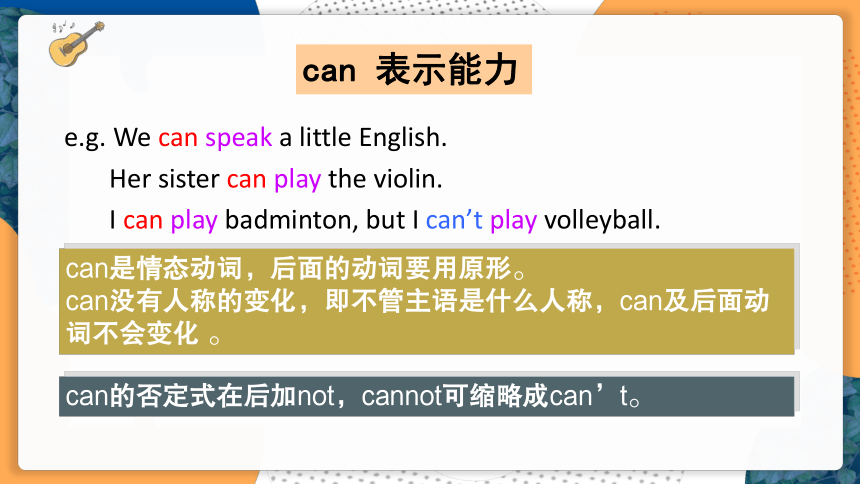
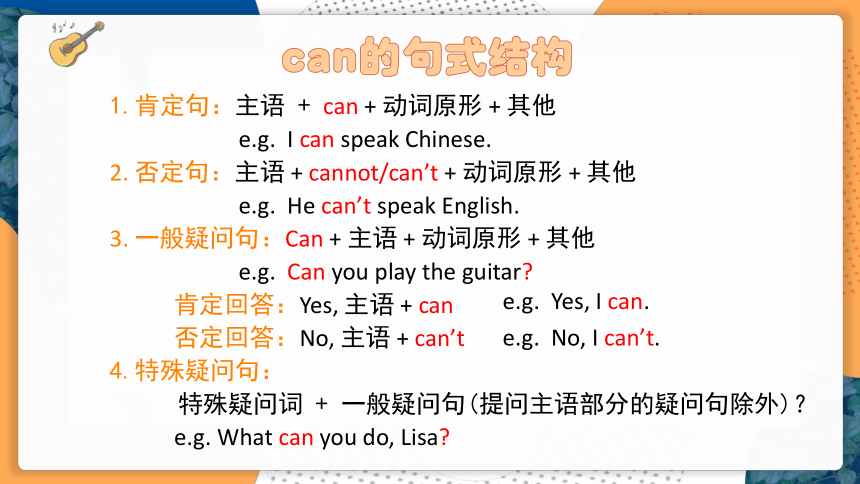
文档简介
(共28张PPT)
Can you play
the guitar
Unit 1
Section A
Grammar Focus-3c
1. To learn to use modal verb can to talk about abilities.
2. To understand the style of recruitment posters (招聘海报).
3. To learn new words: write, show, or, talk.
Learning Objectives
Review
Jane: Hi, Bob. __________________________
Bob: I want to join a sports club.
Jane: Great! _____________________
Bob: Soccer.
Jane: So you can join the soccer club.
Bob: ___________ You’re very good at telling stories. _____________________.
Jane: _______________________________.
Bob: Then join two clubs, the story telling club and the art club!
Jane: ________________!
Role-play
Grammer Focus
Grammar Focus
Can you swim 你会游泳吗? Yes, ______. / No, I can’t.
是的,我会。/不,我不会。
________ play chess 他会下象棋吗? Yes, he can. / No, he can’t.
是的,他会。/不,他不会。
________________ play chess 你和汤姆会下象棋吗? Yes, we can. / No, we ______.
是的,我们会。/不,我们不会。
can’t = cannot
I can
Can he
Can you and Tom
can’t
Can Jane and Jill swim 简和吉尔会游泳吗? Yes, ________. / No, _________.
是的,他们会。/不,他们不会。
_________________ 你会做什么? I can dance. / I can’t sing.
我会跳舞。/ 我不会唱歌。
__________________________ 你想参加哪个俱乐部? We want to join the chess club.
我们想加入象棋俱乐部。
they can
they can’t
What can you do
What club do you want to join
Can you swim Yes, I can. / No, I can’t.
Can he play chess Yes, he can. / No, he can’t.
Can you and Tom play chess Yes, we can. / No, we can’t.
Can Jane and Jill swim Yes, they can. / No, they can’t.
What can you do I can dance. / I can’t sing.
What club do you want to join We want to join the chess club.
can是情态动词,后面接动词原形。can没有人称的变化。
Have a think:
can后的动词形式有何特点? can随人称变化而变化吗?
can的否定形式是什么样的?有缩略形式吗?
can在一般疑问句和特殊疑问句中需要借助助动词吗?
can’t = cannot
情态动词can的疑问句不用借助助动词,将can直接提前,变为疑问语序。
can的否定式在后加not,cannot可缩略成can’t。
can 表示能力
e.g. We can speak a little English.
Her sister can play the violin.
I can play badminton, but I can’t play volleyball.
can是情态动词,后面的动词要用原形。
can没有人称的变化,即不管主语是什么人称,can及后面动词不会变化 。
1.肯定句:主语 + can + 动词原形 + 其他
e.g. I can speak Chinese.
2. 否定句:主语 + cannot/can’t + 动词原形 + 其他
e.g. He can’t speak English.
3. 一般疑问句:Can + 主语 + 动词原形 + 其他
e.g. Can you play the guitar
肯定回答:Yes, 主语 + can
否定回答:No, 主语 + can’t
4.特殊疑问句:
特殊疑问词 + 一般疑问句(提问主语部分的疑问句除外)?
e.g. What can you do, Lisa
can的句式结构
e.g. Yes, I can.
e.g. No, I can’t.
情态动词表示说话人对所说动作的观点,如需要、可能、意愿、怀疑等。
在形式上,情态动词一般没有人称和数的变化。情态动词本身词义不完全,不能单独作谓语动词,必须和不带to的动词原形连用。
情态动词的否定式一般是在其后面加not构成,一般疑问句通常将其提到句首。情态动词的肯定式一般不重读。
情态动词
Write questions and answers with the words and phrases.
3a
1. Wu Jun/speak English/speak Chinese
__________________________________
__________________________________
2. Mike/play basketball/play tennis
__________________________________
__________________________________
Can Wu Jun speak English
No, he can’t, but he can speak Chinese.
Can Mike play basketball
No, he can’t, but he can play tennis.
but表示前后两个句子的意义对比。
3. Jane and Jill/dance/sing
___________________________________
___________________________________
4. Grace/play soccer/play volleyball
___________________________________
___________________________________
5. Bill/write stories/tell stories
___________________________________
___________________________________
3a
Can Jane and Jill dance
No, they can’t, but they can sing.
Can Grace play soccer
No, she can’t, but she can play volleyball.
Can Bill write stories
No, he can’t, but he can tell stories.
Pair Work
Wu Jun/speak English/speak Chinese
Mike/play basketball/play tennis
Jane and Jill/dance/sing
Grace/play soccer/play volleyball
Bill/write stories/tell stories
A: Can Wu Jun speak English
B: No, he can’t, but he can speak Chinese.
Example:
Complete the poster with the words in the box.
3b
Students Wanted for School Show
We want students for the school show. Can you __________ or ___________ Can you ___________ the guitar Can you ___________ stories Please talk to Mr. Zhang after school.
paly sing tell dance
sing/dance
dance/sing
play
tell
通过上下文猜测应填单词的词义和词性。
Read the poster and answer the questions.
1. What kind of show do they want to have
2. What kind of students do they need
3. If you want to join the show, who do you need to talk to
They want to have a school show.
They need students who can sing or dance, play the guitar, or tell stories.
Mr. Zhang.
Students Wanted for School Show
We want students for the school show. Can you sing or dance Can you play the guitar Can you tell stories Please talk to Mr. Zhang after school.
Read and pay attention to the basic elements of a poster:
标题
正文(活动名称、应聘者所需才能、活动联系人)
与正文相配的图片
Look at the poster and answer the questions.
3c
1. When is the school show
2. Where is it
3. Do you want to join the school show What can you do
Work in groups. What can your group do in the school show
I can play the guitar.
I can do kung fu.
I can swim.
I can draw.
I can sing.
Make a list of what you can do in your group.
Li Xin do kung fu
S2 ...
S3
S4
S5
Presentation
In our group,
...can...
...can’t...but...
Summary
情态动词can表示某种能力,意为“能;会”。
肯定句:主语 + can + 动词原形 + 其他
否定句:主语 + cannot/can’t + 动词原形 + 其他
一般疑问句:Can + 主语 + 动词原形 + 其他
肯定回答:Yes, 主语 + can
否定回答:No, 主语 + can’t
特殊疑问句:特殊疑问词 + 一般疑问句(提问主语部分的疑问句除外)?
Exercise
I. 根据括号内的要求完成下列各题,每空一词(含缩略形式)。
1. I can speak Chinese. (改为否定句)
I _______ _______ Chinese.
2. — Can he make model planes (补全肯定答语)
— Yes, _______ _______.
3. Jason can play the erhu. (对划线部分提问)
_______ _______ Jason _______
4. Grace wants to join the art club. (对划线部分提问)
_______ _______ _______ Grace _______ to join
can’t speak
he can
What can do
What club does want
II. 根据汉语意思,完成英语句子,每空一词。
1. Tim会打网球吗?
_______ _______ _______ tennis
2. Alice很会写故事。
Alice _______ _______ _______ very well.
3. 这只鸟会跟你说“你好”。
This bird _______ _______ “hello” to you.
Can Tim play
can write stories
can say
III. 根据对话内容,从方框中选择恰当的选项补全对话。
A: Hey, Alex! (1) _______
B: Sure, Mark. What’s it
A: (2) _______
B: Yes, and I’m very good at it.
A: Really I like playing basketball,
but I can’t play it well. (3) _______
B: Yes, it’s easy. (4) _______
A. We can ask Eric.
B. Can you help me
C. Can you play basketball
D. Can I ask you a question
E. We can play basketball after
school.
D
C
B
E
A: Sounds good. Do you have a basketball
B: No, I don’t. (5) _______ He has two basketballs.
A: OK. Where is Eric
B: He is in the classroom. I think we can play together (一起). Is that OK with you
A: Yes, it’s fine for me.
A. We can ask Eric.
B. Can you help me
C. Can you play basketball
D. Can I ask you a question
E. We can play basketball after
school.
A
Homework
Write down what your group members can do in the school show.
Thank you!
Can you play
the guitar
Unit 1
Section A
Grammar Focus-3c
1. To learn to use modal verb can to talk about abilities.
2. To understand the style of recruitment posters (招聘海报).
3. To learn new words: write, show, or, talk.
Learning Objectives
Review
Jane: Hi, Bob. __________________________
Bob: I want to join a sports club.
Jane: Great! _____________________
Bob: Soccer.
Jane: So you can join the soccer club.
Bob: ___________ You’re very good at telling stories. _____________________.
Jane: _______________________________.
Bob: Then join two clubs, the story telling club and the art club!
Jane: ________________!
Role-play
Grammer Focus
Grammar Focus
Can you swim 你会游泳吗? Yes, ______. / No, I can’t.
是的,我会。/不,我不会。
________ play chess 他会下象棋吗? Yes, he can. / No, he can’t.
是的,他会。/不,他不会。
________________ play chess 你和汤姆会下象棋吗? Yes, we can. / No, we ______.
是的,我们会。/不,我们不会。
can’t = cannot
I can
Can he
Can you and Tom
can’t
Can Jane and Jill swim 简和吉尔会游泳吗? Yes, ________. / No, _________.
是的,他们会。/不,他们不会。
_________________ 你会做什么? I can dance. / I can’t sing.
我会跳舞。/ 我不会唱歌。
__________________________ 你想参加哪个俱乐部? We want to join the chess club.
我们想加入象棋俱乐部。
they can
they can’t
What can you do
What club do you want to join
Can you swim Yes, I can. / No, I can’t.
Can he play chess Yes, he can. / No, he can’t.
Can you and Tom play chess Yes, we can. / No, we can’t.
Can Jane and Jill swim Yes, they can. / No, they can’t.
What can you do I can dance. / I can’t sing.
What club do you want to join We want to join the chess club.
can是情态动词,后面接动词原形。can没有人称的变化。
Have a think:
can后的动词形式有何特点? can随人称变化而变化吗?
can的否定形式是什么样的?有缩略形式吗?
can在一般疑问句和特殊疑问句中需要借助助动词吗?
can’t = cannot
情态动词can的疑问句不用借助助动词,将can直接提前,变为疑问语序。
can的否定式在后加not,cannot可缩略成can’t。
can 表示能力
e.g. We can speak a little English.
Her sister can play the violin.
I can play badminton, but I can’t play volleyball.
can是情态动词,后面的动词要用原形。
can没有人称的变化,即不管主语是什么人称,can及后面动词不会变化 。
1.肯定句:主语 + can + 动词原形 + 其他
e.g. I can speak Chinese.
2. 否定句:主语 + cannot/can’t + 动词原形 + 其他
e.g. He can’t speak English.
3. 一般疑问句:Can + 主语 + 动词原形 + 其他
e.g. Can you play the guitar
肯定回答:Yes, 主语 + can
否定回答:No, 主语 + can’t
4.特殊疑问句:
特殊疑问词 + 一般疑问句(提问主语部分的疑问句除外)?
e.g. What can you do, Lisa
can的句式结构
e.g. Yes, I can.
e.g. No, I can’t.
情态动词表示说话人对所说动作的观点,如需要、可能、意愿、怀疑等。
在形式上,情态动词一般没有人称和数的变化。情态动词本身词义不完全,不能单独作谓语动词,必须和不带to的动词原形连用。
情态动词的否定式一般是在其后面加not构成,一般疑问句通常将其提到句首。情态动词的肯定式一般不重读。
情态动词
Write questions and answers with the words and phrases.
3a
1. Wu Jun/speak English/speak Chinese
__________________________________
__________________________________
2. Mike/play basketball/play tennis
__________________________________
__________________________________
Can Wu Jun speak English
No, he can’t, but he can speak Chinese.
Can Mike play basketball
No, he can’t, but he can play tennis.
but表示前后两个句子的意义对比。
3. Jane and Jill/dance/sing
___________________________________
___________________________________
4. Grace/play soccer/play volleyball
___________________________________
___________________________________
5. Bill/write stories/tell stories
___________________________________
___________________________________
3a
Can Jane and Jill dance
No, they can’t, but they can sing.
Can Grace play soccer
No, she can’t, but she can play volleyball.
Can Bill write stories
No, he can’t, but he can tell stories.
Pair Work
Wu Jun/speak English/speak Chinese
Mike/play basketball/play tennis
Jane and Jill/dance/sing
Grace/play soccer/play volleyball
Bill/write stories/tell stories
A: Can Wu Jun speak English
B: No, he can’t, but he can speak Chinese.
Example:
Complete the poster with the words in the box.
3b
Students Wanted for School Show
We want students for the school show. Can you __________ or ___________ Can you ___________ the guitar Can you ___________ stories Please talk to Mr. Zhang after school.
paly sing tell dance
sing/dance
dance/sing
play
tell
通过上下文猜测应填单词的词义和词性。
Read the poster and answer the questions.
1. What kind of show do they want to have
2. What kind of students do they need
3. If you want to join the show, who do you need to talk to
They want to have a school show.
They need students who can sing or dance, play the guitar, or tell stories.
Mr. Zhang.
Students Wanted for School Show
We want students for the school show. Can you sing or dance Can you play the guitar Can you tell stories Please talk to Mr. Zhang after school.
Read and pay attention to the basic elements of a poster:
标题
正文(活动名称、应聘者所需才能、活动联系人)
与正文相配的图片
Look at the poster and answer the questions.
3c
1. When is the school show
2. Where is it
3. Do you want to join the school show What can you do
Work in groups. What can your group do in the school show
I can play the guitar.
I can do kung fu.
I can swim.
I can draw.
I can sing.
Make a list of what you can do in your group.
Li Xin do kung fu
S2 ...
S3
S4
S5
Presentation
In our group,
...can...
...can’t...but...
Summary
情态动词can表示某种能力,意为“能;会”。
肯定句:主语 + can + 动词原形 + 其他
否定句:主语 + cannot/can’t + 动词原形 + 其他
一般疑问句:Can + 主语 + 动词原形 + 其他
肯定回答:Yes, 主语 + can
否定回答:No, 主语 + can’t
特殊疑问句:特殊疑问词 + 一般疑问句(提问主语部分的疑问句除外)?
Exercise
I. 根据括号内的要求完成下列各题,每空一词(含缩略形式)。
1. I can speak Chinese. (改为否定句)
I _______ _______ Chinese.
2. — Can he make model planes (补全肯定答语)
— Yes, _______ _______.
3. Jason can play the erhu. (对划线部分提问)
_______ _______ Jason _______
4. Grace wants to join the art club. (对划线部分提问)
_______ _______ _______ Grace _______ to join
can’t speak
he can
What can do
What club does want
II. 根据汉语意思,完成英语句子,每空一词。
1. Tim会打网球吗?
_______ _______ _______ tennis
2. Alice很会写故事。
Alice _______ _______ _______ very well.
3. 这只鸟会跟你说“你好”。
This bird _______ _______ “hello” to you.
Can Tim play
can write stories
can say
III. 根据对话内容,从方框中选择恰当的选项补全对话。
A: Hey, Alex! (1) _______
B: Sure, Mark. What’s it
A: (2) _______
B: Yes, and I’m very good at it.
A: Really I like playing basketball,
but I can’t play it well. (3) _______
B: Yes, it’s easy. (4) _______
A. We can ask Eric.
B. Can you help me
C. Can you play basketball
D. Can I ask you a question
E. We can play basketball after
school.
D
C
B
E
A: Sounds good. Do you have a basketball
B: No, I don’t. (5) _______ He has two basketballs.
A: OK. Where is Eric
B: He is in the classroom. I think we can play together (一起). Is that OK with you
A: Yes, it’s fine for me.
A. We can ask Eric.
B. Can you help me
C. Can you play basketball
D. Can I ask you a question
E. We can play basketball after
school.
A
Homework
Write down what your group members can do in the school show.
Thank you!
同课章节目录
- Unit 1 Can you play the guitar?
- Section A
- Section B
- Unit 2 What time do you go to school?
- Section A
- Section B
- Unit 3 How do you get to school?
- Section A
- Section B
- Unit 4 Don't eat in class.
- Section A
- Section B
- Unit 5 Why do you like pandas?
- Section A
- Section B
- Unit 6 I'm watching TV.
- Section A
- Section B
- Review of Units 1-6
- Unit 7 It's raining!
- Section A
- Section B
- Unit 8 Is there a post office near here?
- Section A
- Section B
- Unit 9 What does he look like?
- Section A
- Section B
- Unit 10 I'd like some noodles.
- Section A
- Section B
- Unit 11 How was your school trip?
- Section A
- Section B
- Unit 12 What did you do last weekend?
- Section A
- Section B
